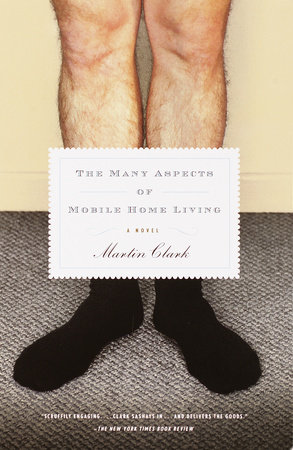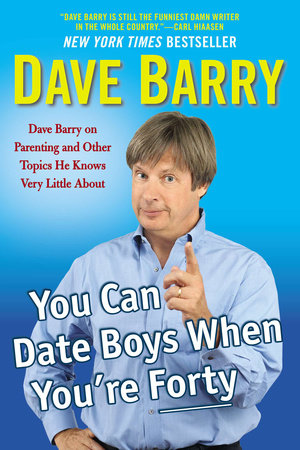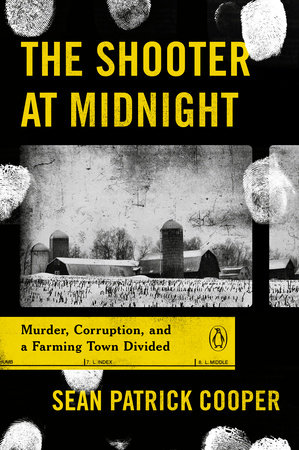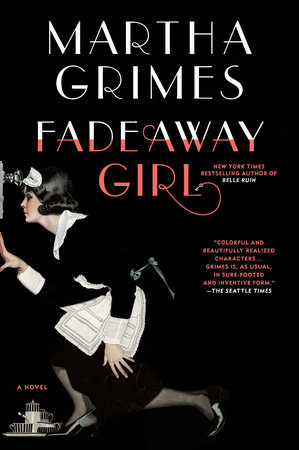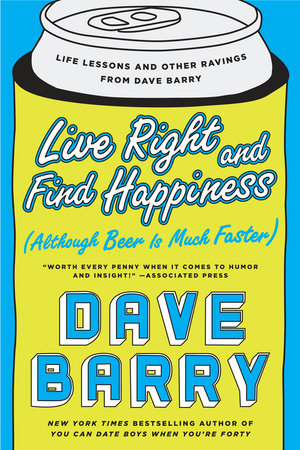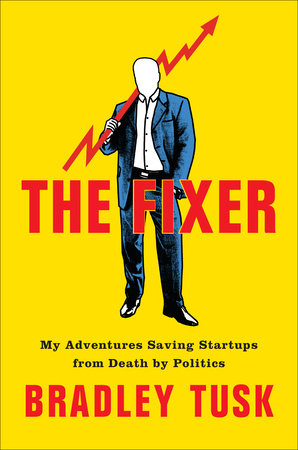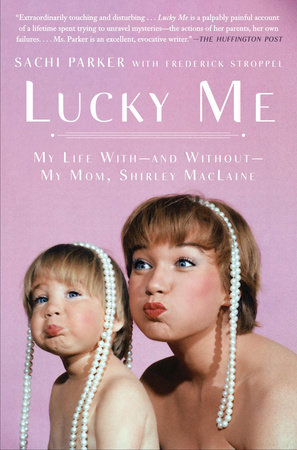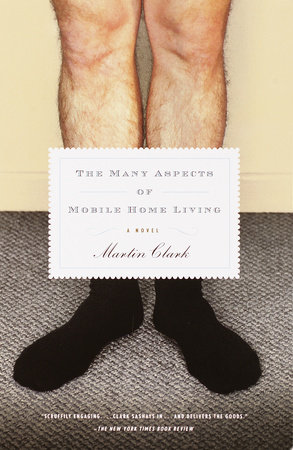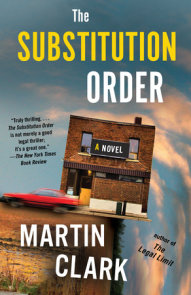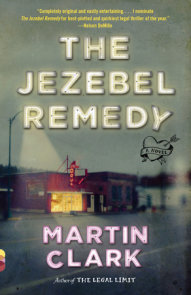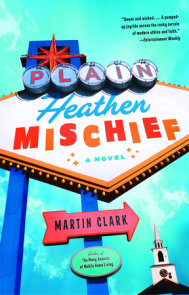Author Q&A
Q: How much does Evers Wheeling, young North Carolina judge and main character of The Many Aspects of Mobile Home Living, have in common with Martin Clark, young Virginia judge and author?
A: What is it that duplicitous politicians and guilty-as-sin criminal defendants always say when you ask them a question they really don’t want to answer — generally something along the lines of "Gee, I’m glad you asked that." I hope this doesn’t sound quite that disingenuous, but I truly am glad I get a chance to discuss our similarities — or lack of the same — because it’s important, considering the nature of my day job, for me to put a little distance between myself and Evers. The bottom line is that we don’t share many lifestyle common denominators. And what other answer did you think I’d give? It’s like the question on Virginia’s gun permit application: Do you now use or sell illegal drugs? We’ll damn sure keep the guns away from the druggies with that kind of self-screening honor system. Honestly, though, my life is pretty much rural white-bread. I have a rooster, a pickup truck, a fly rod and a lawn tractor. Unlike Evers, I don’t smoke, don’t use drugs, don’t want my wife dead, don’t suffer from aspiration angst and don’t spend weeks at a time in a hand-wringing funk. In fact, in terms of demeanor and personal habits, I probably have more in common with Pauletta than Evers, although I do relate very much to some of his struggles with trust, faith, friendship, relationships, politics and the way things seem to play out in the world.
Q: Your novel takes on, among many things, perjury, bribery, theft, crooked cops and people who get away with murder. Doesn’t speak too highly of our justice system. Are these things you’ve seen firsthand?
A: The court system is flooded with lies, cons, scams, flip-flops, zigzags and pitifully dumb excuses. For instance, a couple weeks ago a defendant — with look-you-in-the-eye earnestness — told twelve jurors that he had confessed to sodomizing a young boy so the child wouldn’t be charged with making a false report to the police. That was an especially nice touch; this cad was so concerned about the kid who’d reported him that he didn’t want to get the victim in trouble by contradicting his story. Then there’s the daily appearance of the "two dudes" defense and all its variants: "Really, this TV is stolen? Hey, I got it from two dudes — one was named Harold and the other was this guy from South Carolina they call ‘Ace.’ Never seen them before that day, ain’t seen them since." People lie all the time; they lie to get money or property or an extra twenty dollars shaved from a child support payment. That doesn’t mean, though, that the system itself is broken or corrupt. Most judges I know — in fact every judge I know — is honest and decent. All things given, I think we do a good job of wading through all the bogs and swearing contests to get a satisfactory outcome.
Q: How about the police? There’ve been some horrible instances of police misconduct brought to light in recent years.
A: No doubt about it. Police officers are simply men and women in uniforms, and they’re going to be subject to the same failings and shortcomings as anyone else. Fortunately, the people I work with are pretty solid and trustworthy, but I have known officers to lie and shade the truth. It’s always an interesting dilemma for the cops when they have a defendant who’s dead-solid guilty, but they’ve fouled up something along the way. Do you let a murderer go free because of some abstract rule of law or lie about how you conducted the search and send him to jail? Still, I worry more about the legally sanctioned practices that are appearing in law enforcement than the spectacular stories that make it to Sixty Minutes. I was traveling home from work the other day and sat in a traffic check for fifteen minutes. The police stopped every car, without any reason or probable cause. That’s just wrong, but the Supreme Court has no problem with it. This kind of subtle intrusion won’t be rolled back anytime soon, and the state gets a little closer to your doorstep every minute. But no, I’m not planning on collecting my bandoliers and heading to Montana with a year’s worth of canned food and bottled water.
Q: Both Evers and Ruth Esther are especially loyal and committed to their brothers, brothers who do some pretty terrible things. Do you have brothers yourself? What made the idea of brotherhood something you wanted to explore here?
A: I’m only a child, but I value friendship — true, dedicated friendship — more than just about anything else I know of. At some point in your life, no matter who you are, there will come a time when you have to rely on someone else’s help and generosity, when you’ll just have to sit there with your hand out and hope. That give and take, most notably the giving, reveals a lot about people and families, and makes for good fiction.
Q: How did you come to be one of the youngest circuit court judges in the history of the commonwealth of Virginia, and what made you decide to turn your talents to writing?
A: Judges in Virginia are appointed by the legislature based on the recommendations of local bar groups. Inasmuch as I got the gig, it’s probably no surprise to anyone that I think we have a good system. You’re nominated by the people who are going to have to live with you, who’ve worked with you, and who’ve broken bread with you at the diner around the corner from the courthouse. Then you’re questioned and scrutinized by the general assembly. The idea of popularly elected judges strikes me as ludicrous and unworkable — I mean, what platform do you run on? Elect me and I’ll abolish The Bill of Rights? More dollars for plaintiffs with soft-tissue injuries only chiropractors can identify? And what do you do when the lawyer who gave you ten grand shows up in your court? As for my age relative to my job — I started on the bench when I was thirty-three — it’s just one of those things that happened. I wish I had a better story to tell about it, but I don’t.
To answer the other part of your question, I started writing in college, and I have the rejection letters to prove it. One editor wrote back and told me that my writing gave her vertigo; I still have that one. When I became a judge, I’d already written several chapters of Mobile Home Living.
Q: There is a dose of the mystical here — for example, a woman who cries white tears that bring good luck to the men who pray to them. What made you decide to introduce a fantastical element to this novel?
A: It’s interesting that you use the words "mystical" and "fantastical." I’d like to think that "religious" and "spiritual" are a little more apt. I realize this characterization will strike some readers as odd, especially in light of the fact that I wrote a book filled with dopers, drunks, murderers, rascals and thieves and included more than a little sex and profanity. But I’m a religious person and I wanted to give faith and divine belief a fair and evenhanded exploration in my novel. For me, religion is a deeply personal, introspective affair that comes with difficult questions and occasional, wonderful insights. I don’t know that I want to go on too much about that aspect of the book. Like everyone else, I’ve had enough of holy grandstanders and self-promoters: Bill Clinton "in prayer" at the White House, Mike Tyson praising Allah for giving him the strength to swat the fool out of some liquor-salesman-turned-boxer. I guess the best way to leave it is to simply say that I hope some of the goodness I find in my faith has made its way into my writing. And…oh…so you believed in the magic tears, huh?
Q: This novel is chock full of wonderful, darkly comic moments, but one of the most inspired has to be Evers’ tying his adulterous wife naked to the sign on the side of the highway for the city of Climax, North Carolina. Where did that come from?
A: Thanks for the compliment. There really is a Climax road sign. At least, there really is a Climax, North Carolina. I’m not certain the sign’s still around, although I’m positive it used to be right out there on route 220, not far from Greensboro. Perhaps someone could go look; if the sign has disappeared, you could still check out the Richard Petty Racing Museum and the Asheboro zoo.
Q: Evers’ wife Jo Miller (and other characters) accuse him at times of hating women and yet his relationships with the women in this novel are actually quite touching. Why the misperception?
A: I wrote a scene in which Evers was talking to his mother on her deathbed, telling her how much affection he had for her and his wife, even after his wife had declared that she liked life better without him. It was, I thought, a very sad and sincere passage, but it didn’t quite fit into the story line and ended up cut. I’ve got a bunch of those, by the way, some fun riffs and two-page vignettes that really roll along but don’t have much — okay, anything — to do with the overall narrative. I’m thinking of doing something similar to a "director’s cut" release or outtakes video, just hooking the culls onto the end of the book in no particular order. Perhaps Knopf will reissue Mobile Home Living in twenty-five years with a flashy silver cover and thirty or so additional pages.
At any rate, despite his battles with his wife, Evers is a kind person. He’s occasionally disillusioned and frequently unhappy, but never mean-spirited and never bitter. When his wife hammers him about his attitude toward women, it’s to some extent self-serving on her part. Evers has a number of weaknesses and undesirable traits, but thinking that Al Sharpton is a tubby fraud doesn’t make him a racist and not liking Betty Friedan hardly proves that he’s a misogynist. He adores and trusts Pauletta; he cares for his wife even after she’s dumped him; and in the end, a woman is at the center of his life being reclaimed.
Q: Evers has an ongoing problem with what he calls "alikeness." In his words, "It’s depressing to know that there are a shitload of people out there just like me, all of us sort of being carried along, bumping into things." Is this something you wrestle with as well?
A: I suppose I do to some extent, but no more than anyone else. Most people want to do well, and almost everyone enjoys standing out, being praised, any kind of pleasant attention, whether it gets you a pat on the back or a quick trip past the velvet rope. I write because I like doing it, in the same way that some folks enjoy playing golf or bowling or digging up fossils and pottery shards. I didn’t write a book in hopes I would become noteworthy, but sure, I wouldn’t mind spending a few months in the big time, swapping war stories with Norman Mailer and jetting with my entourage to the Mirage. Basically, though, I’m content to blend in these days. I keep my eyes down in a crowd and rarely glance up — that comes, I think, from being happy and settled and looking forward to returning home after work.
